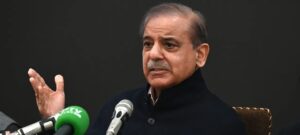 In Pakistan, following intense negotiations post-election, the Pakistan People’s Party (PPP) and the conservative Pakistan Muslim League-Nawaz (PML-N) have agreed to form a coalition government with former Prime Minister Shehbaz Sharif set to lead the alliance. The coalition, supported by the military, aims to swiftly establish governance in Pakistan, as announced by former Foreign Minister Bilawal Bhutto Zardari in a joint press conference with Shehbaz Sharif.
In Pakistan, following intense negotiations post-election, the Pakistan People’s Party (PPP) and the conservative Pakistan Muslim League-Nawaz (PML-N) have agreed to form a coalition government with former Prime Minister Shehbaz Sharif set to lead the alliance. The coalition, supported by the military, aims to swiftly establish governance in Pakistan, as announced by former Foreign Minister Bilawal Bhutto Zardari in a joint press conference with Shehbaz Sharif.
Coalition led by former Prime Minister Sharif agreed
Just under two weeks after the election in Pakistan, the country seems to be on the brink of forming a government: The People’s Party has reached a coalition agreement with the Muslim League, with former Prime Minister Sharif at the helm.
In Pakistan, a government led by former Prime Minister Shehbaz Sharif appears to be forming. After ten days of intense negotiations, the conservative party Pakistan Muslim League-Nawaz (PML-N) supported by the military, led by Sharif, and the Pakistan People’s Party (PPP) announced late Tuesday night that the ongoing negotiations involving several minor parties had concluded.
Sharif to lead coalition
The two parties aim to form a government as quickly as possible, said former Foreign Minister Bilawal Bhutto Zardari, who ran as the leading candidate for the PPP. During a press conference with Shehbaz Sharif, he confirmed that the former leader of the Muslim League would lead the coalition and become the new Prime Minister of Pakistan. The alliance proposes his father, Asif Ali Zardari, as President. Zardari is the widower of former Prime Minister Benazir Bhutto. Their son, Bilawal Bhutto Zardari, is the chairman of the PPP. Zardari announced during a joint press conference with Sharif that the ministerial positions had been decided and would be announced in the coming days. According to the Pakistani constitution, a parliamentary session must be convened by February 29, where a vote for a new Prime Minister will take place. In Pakistan, the Prime Minister is elected by a simple majority in the National Assembly for a five-year term.
The parliamentary elections in Pakistan on February 8 ended without a clear winner. Candidates supported by the incarcerated former Prime Minister Imran Khan won the most seats. Both Khan and former Prime Minister Sharif claimed victory. Nawaz, the older brother of Shehbaz Sharif, had proposed him as the candidate for the position of Prime Minister.
The PPP and PML-N are parties dominated by family dynasties that have been influential in Pakistani politics for decades – typically as bitter rivals. In 2022, they allied to remove Khan from office through a vote of no confidence and subsequently governed in an unstable coalition until the parliament was dissolved in August.
Election overshadowed by manipulation allegations
Following the election, there were widespread allegations of electoral fraud and result manipulation after authorities shut down the nationwide mobile network on election day citing security reasons, and the vote count lasted over 24 hours. The election campaign in Pakistan was marred by violence, the incarceration of Khan, and hindrances faced by his party PTI from the military-led establishment. The popular former Prime Minister and cricket star was sentenced to lengthy prison terms a few days before the election for treason, bribery, and an illegal marriage.
Since Pakistan’s independence over 75 years ago following the partition of British India, the country has experienced periods of unrest and instability. The military ruled for more than half of this time. Even under civilian governments, generals were regarded as the force that could decide the success or failure of the political leadership.
With 241 million inhabitants – roughly three times the population of Germany – the country is grappling with an economic crisis and soaring levels of inflation.

